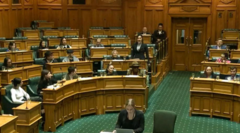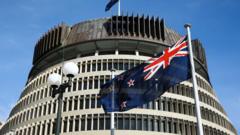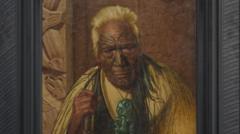More than 40,000 demonstrators gathered outside New Zealand's parliament to protest a controversial bill that aims to reinterpret the Treaty of Waitangi, an essential document in the country's history between the British colonial powers and the Māori people. The event, which wrapped up a nine-day peaceful protest known as a hīkoi, highlighted fears among Māori communities regarding potential erosion of their rights.
The proposed Treaty Principles bill has provoked significant backlash, with critics asserting it seeks to diminish Māori rights in favor of a legal framework that they argue no longer accommodates the nation’s contemporary multicultural demographic. Advocates of the bill, including its sponsor from the governing Act party, suggest that the treaty's application has perpetuated societal division instead of promoting unity.
The demonstration gained momentum as thousands, adorned in the colors of the Māori flag, walked through Wellington, marking one of the largest protests in New Zealand's history. This assembly surpassed the numbers witnessed during similar demonstrations in 1975 and 2004, indicating a renewed urgency among activists in addressing issues related to Māori rights and representation.
The protest coincided with parliamentary discussions on the bill, attended by key political figures including Prime Minister Christopher Luxon. Despite being part of the same coalition as Act, Luxon declared that the bill lacked support beyond its second reading and would not become law, emphasizing that historical treaties should not be rewritten superficially.
Concerns over the bill sparked heated discussions among New Zealanders. Supporters of the protests see the hīkoi as a fight for historical justice and cultural preservation. "We will fight against this bill for the rights of all New Zealanders," stated Stan Lingman, a demonstrator with both Māori and Swedish ancestry.
While many rallied in solidarity with the Māori community, some expressed the sentiment that demands for equity have become excessive. This division highlights ongoing tensions related to race relations within the country.
Debbie Ngarewa-Packer, co-leader of the Māori Party, argued that true equality cannot exist if indigenous communities remain marginalized. Reflecting on the historical and cultural significance of the hīkoi, she criticized the government for risking the unity that New Zealand is often celebrated for.
The bill's contentious discussion reached the parliamentary floor, with MPs performing a traditional haka in opposition last week, an action that resonated deeply with the public and heightened awareness of the issue.
This event marked a powerful display of unity among Māori communities and their allies. As they emphasized the shared legacy to be protected for future generations, organizers noted that the hīkoi was inclusive of all New Zealanders, extending an invitation for broader demographics to join them in their struggle for justice and equality.



















